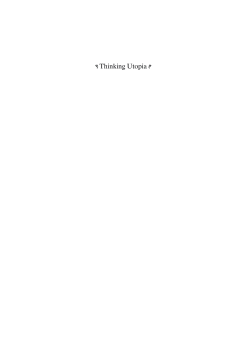
Additional Information
Book Details
Abstract
After the breakdown of socialist and communist systems in the East, it had become fashionable to declare the so-called "end of utopia" ("end of history," "end of narratives"). The authors of this volume do not share this view but think that it is time to rehabilitate utopian thought. The political concept of Utopia that has given its name to these transcendental projections onto the world has been too narrow to describe and analyze the moving forces of the mind perceiving human existence beyond reality. By broadening the perspectives of utopian studies, these essays enable the reader to reconstruct scholarly paradigms and strategies of utopian, complex and holistic thinking in modern cosmology, philosophy, sociology, in literary, historical and political sciences, and to compare traditions and ways of Western utopian thought to the practice in the East.
“…a highly readable and structured discussion about utopian thinking at the beginning of the 21st century…It is indeed fortunate that political scientists, historians, philosophers, art critics, and literary theorists have come together to share their thinking on utopia and utopian thought at this disastrous moment of human history, when many are asking if there is a future to which to look forward.” · European Legacy
Michael Fehr has been Director of the Karl Ernst Osthaus-Museum of the City of Hagen, Germany, since 1987. Prior to that he was Assistant Professor at the Bergische Universität Wuppertal, and Deputy Director at the Art Museum of the City of Bochum. He has curated numerous exhibitions on contemporary art, cultural history and city planning, and, in the 1970s, created and organized for almost one decade the Kemnade International, a cultural festival for immigrant workers and their families in Germany. He has published extensively on contemporary art as well as on theory of museums. He teaches museology at University of Bonn.
Thomas W. Rieger studied Art History, Archeology, City Planning and History at Universities Bonn, Zürich, Berlin and Columbia University, New York. He has been working at Museum of Contemporary History Bonn (Stiftung Haus der Geschichte) from 1993 to 1998, and since 1999 at Karl Ernst Osthaus-Museum Hagen as co-curator of the exhibition project Museutopia - Steps Into Other Worlds (2002). He teaches Theory of Architecture at RWTH Aachen.
Jörn Rüsen was Professor of Modern History at Universities Bochum and Bielefeld for many years. From 1994 to 1997 he was Director of the Center for Interdisciplinary Research (ZiF) at Bielefeld. Since 1997 he has been President of the Institute for Advanced Study in the Humanities Essen (Kulturwissenschaftliches Institut). He specialises in theory and methodology of historical sciences, the history of historiography, intercultural aspects of historical thinking, theory of historical learning, and the history of human rights.
Table of Contents
| Section Title | Page | Action | Price |
|---|---|---|---|
| Thinking Utopia | 1 | ||
| Contents | 5 | ||
| List of Illustrations | 7 | ||
| Preface and Acknowledgements | 9 | ||
| Chapter 1. The Necessity of Utopian Thinking | 13 | ||
| PART I. POLITICS, CONSTRUCTION AND FUNCTIONS OF UTOPIAN THINKING | 27 | ||
| Chapter 2. Aspects of the Western Utopian Tradition | 29 | ||
| Chapter 3. Visions of the Future | 44 | ||
| Appendix: Some Concomitants of the Dimensions of Sociality | 63 | ||
| Chapter 4. Utopia, Contractualism, Human Rights | 65 | ||
| Chapter 5. On the Construction of Worlds | 79 | ||
| PART II. ARTIFICIAL WORLDS AND THE ‘NEW MAN’ | 99 | ||
| Chapter 6. Bodies in Utopia and Utopian Bodies in Imperial China | 101 | ||
| Chapter 7. Science, Technology and Utopia: Perspectives of a Computer-Assisted Evolution of Humankind | 116 | ||
| Chapter 8. ‘Thinking about the Unthinkable’ | 132 | ||
| Chapter 9. Natural Utopianism in Everyday Life Practice | 148 | ||
| PART III. MUSEUM AS UTOPIAN LABORATORY | 161 | ||
| Chapter 10. Haunted by Things | 163 | ||
| Chapter 11. Art – Museum – Utopia | 181 | ||
| Chapter 12. Art, Science, Utopia in the Early Modern Period | 186 | ||
| Chapter 13. Utopiary | 202 | ||
| PART IV. UTOPIA AS A MEDIUM OF CULTURAL COMMUNICATION | 217 | ||
| Chapter 14. The Utopian Vision, East and West | 219 | ||
| Chapter 15. Trauma | 242 | ||
| Chapter 16. From Revolutionary to Catastrophic Utopia | 259 | ||
| Chapter 17. The Narrative Staging of Image and Counter-Image | 275 | ||
| Chapter 18. Rethinking Utopia | 288 | ||
| Notes on Contributors | 295 | ||
| Index | 305 |
